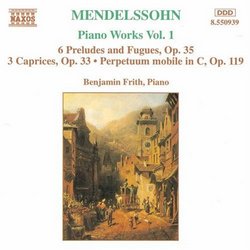| All Artists: Felix [1] Mendelssohn, Benjamin Frith Title: Mendelssohn: Piano Works Vol. 1 Members Wishing: 0 Total Copies: 1 Label: Naxos Original Release Date: 1/1/1995 Re-Release Date: 5/23/1995 Genre: Classical Style: Opera & Classical Vocal Number of Discs: 1 SwapaCD Credits: 1 UPC: 730099593922 |
Search - Felix [1] Mendelssohn, Benjamin Frith :: Mendelssohn: Piano Works Vol. 1
 | Felix [1] Mendelssohn, Benjamin Frith Mendelssohn: Piano Works Vol. 1 Genre: Classical
![header=[] body=[This CD is available to be requested as disc only.]](/images/attributes/disc.png?v=a4e11020) ![header=[] body=[This CD is available to be requested with the disc and back insert.]](/images/attributes/disc_back.png?v=a4e11020) ![header=[] body=[This CD is available to be requested with the disc and front insert.]](/images/attributes/disc_front.png?v=a4e11020) ![header=[] body=[This CD is available to be requested with the disc, front and back inserts.]](/images/attributes/disc_front_back.png?v=a4e11020) |
Larger Image |
CD Details |
CD ReviewsExquisite and intelligent piano music Hexameron | 02/07/2007 (4 out of 5 stars) "With so many recordings of the Violin Concerto, the Midsummer Night's Dream, and Italian symphony, how often do we get a chance to explore Mendelssohn's piano compositions? It is rare that we find a pianist championing even the war-horses like the Variations serieuses or the Rondo capriccioso. For five volumes, however, Naxos has decided to enlist Benjamin Frith's pianism for recording Mendelssohn's piano works. I can tell from this first volume that Mendelssohn's piano compositions are unfairly neglected. And this disc is not even the best representation of Mendelssohn's keyboard powers. Nevertheless, there is nothing abhorrent, distasteful, or even banal to be found here.
The Six Preludes and Fugues Op. 35 are perhaps one of the best bridges between Beethoven's and Franck's fugues. In the days when miniatures and etudes were replacing the old fugue, Mendelssohn proves that it's still propitious to pour musical ideas into this ancient mold. I can confidently declare that all six of these are worth concentrated listenings. If I were to pick the three best, I would say No. 1, 3 and 6 are the most fantastic and inspired. No. 1 is indeed the most popular, and if it wasn't for Murray Perahia's mindblowing performance of this, I could praise Benjamin Frith's interpretation; unfortunately, his playing of the fugue is incomparable to Perahia's duality of expressive power and clarity of voicing. To be fair, Frith does a tremendous job with No. 6; the most gorgeous prelude of them all resides here. A couple of hearings makes it clear, in my mind, that there is an originality in all of these fugues. Each fugue theme is of a different characteristic: some are daring in length and others are simple and short; some are rapidly fast and others lugubriously slow. Ultimately, the Op. 35 remains Mendelssohn's great trophy of piano composition. Although not nearly on par with Beethoven's sublime fugues, Mendelssohn's seek to revive the glorious potential of the polyphonic genre and showcase new Romantic ideas as well. Even though I slighted Frith's execution of the No. 1 in E minor, it's only because I prefer Perahia's fire. Frith's playing is still admirable, virtuosic and immaculate; he never smears the fugal voices either. The Op. 33 Caprices are rather strange in their design. Each one consists of a hefty 8 minutes and they are schizophrenic in mood; indeed, they are capricious "caprices." Take No. 1 in A minor: it starts out absolutely beautiful with its haunting arpeggios, but then a frisky rhythmic idea takes over and the piece becomes a Presto agitato. For 8 minutes, Mendelssohn sustains new melodies and introduces new ideas as if they were improvised. The first Caprice is a wholly attractive one, dramatic but always conservative. The second Caprice is slightly subdued in its emotional content at first. But there are several brief moments in this fantasy that are startlingly passionate; some sound reminiscent of Beethovian "Sturm und Drang." The third and last Caprice is another dichotomy of beautiful and brooding music combined with agitated sections that seem unsure where to go. As fantasies, the Op. 33 are devoid of recurring themes, but still manage to appeal to the ears because of Mendelssohn's penchant for almost constantly pouring out brief melodious ideas. The last piece on the disc, the Perpetuum mobile Op. 119, is a scherzo-like flurry of scintillating notes; I could not hum the tune for you if I tried, but it's still endearing for its sprightly nature. Bottom line: Those seeking to explore Mendelssohn's piano music for the first time should seek Perahia's recording on CBS masterworks. However, the Mendelssohn aficionado or curious pianophile will find this recording worthwhile. It's a fascinating glimpse into Mendelssohn's pianistic style. I guarantee these preludes and fugues are among the best of the 19th century. The caprices are also interesting diversions. Since this music possesses sophistication and elegance, you will be hard-pressed to find drama or bursting emotions. That warning will either be relieving or repellant, but at this Naxos price, why not explore anyway?" |

 Track Listings (16) - Disc #1
Track Listings (16) - Disc #1